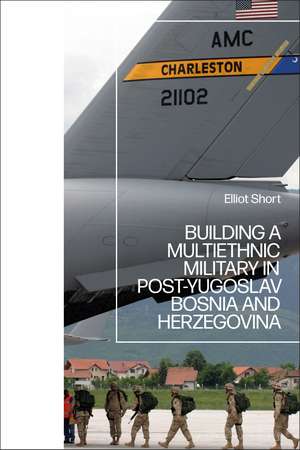Building a Multiethnic Military in Post-Yugoslav Bosnia and Herzegovina
Autor Elliot Shorten Limba Engleză Paperback – 20 sep 2023
| Toate formatele și edițiile | Preț | Express |
|---|---|---|
| Paperback (1) | 192.30 lei 6-8 săpt. | |
| Bloomsbury Publishing – 20 sep 2023 | 192.30 lei 6-8 săpt. | |
| Hardback (1) | 540.65 lei 6-8 săpt. | |
| Bloomsbury Publishing – 23 mar 2022 | 540.65 lei 6-8 săpt. |
Preț: 192.30 lei
Preț vechi: 249.87 lei
-23% Nou
Puncte Express: 288
Preț estimativ în valută:
36.79€ • 38.42$ • 30.39£
36.79€ • 38.42$ • 30.39£
Carte tipărită la comandă
Livrare economică 15-29 aprilie
Preluare comenzi: 021 569.72.76
Specificații
ISBN-13: 9781350191013
ISBN-10: 1350191019
Pagini: 272
Ilustrații: 25 bw illus
Dimensiuni: 156 x 234 x 25 mm
Greutate: 0.39 kg
Editura: Bloomsbury Publishing
Colecția Bloomsbury Academic
Locul publicării:London, United Kingdom
ISBN-10: 1350191019
Pagini: 272
Ilustrații: 25 bw illus
Dimensiuni: 156 x 234 x 25 mm
Greutate: 0.39 kg
Editura: Bloomsbury Publishing
Colecția Bloomsbury Academic
Locul publicării:London, United Kingdom
Caracteristici
Employs an interdisciplinary approach which provides a fresh perspective on both the Yugoslav wars and on the process of state building in modern European history
Notă biografică
Elliot Short is an independent scholar who obtained his PhD in History from the University of East Anglia, UK. He is the author, along with Milt Lauenstein, of Peace and Conflict since 1991: War, Intervention and Peacebuilding Organizations (2020). More information can be found at elliotshort.com.
Cuprins
List of IllustrationsList of MapsAcknowledgementsList of AcronymsForeword by Rohan MaxwellIntroductionPart I. Precursors1. The Region before the Second World War2. The Yugoslav People's ArmyPart II. Components3. The Army of Republika Srpska4. The Army of the Republic of Bosnia and Herzegovina and the Croat Defence CouncilPart III. Construction5. The Entity Armies, 1995-20026. The Orao Affair and Military Integration7. The Armed Forces of Bosnia and HerzegovinaConclusionBibliographyIndex
Recenzii
This meticulous study on the army gives the reader insight into Bosnia and Hercegovina's core strengths and achievements since 1995. Short's work is likely to be if great interest to regional and military expects and scholars of national identity.
Building a Multiethnic Military in Post-Yugoslav Bosnia-Herzegovina offers the first history of how the three separate militaries in existence when the war in Bosnia-Herzegovina ended were integrated into one multi-ethnic armed force, in the face of wartime legacies and post-war polarisations. Short's detailed account complicates the idea that peace inevitably led to the integration of the military, and is indispensable for any reader interested in Bosnian defence reform or how the Bosnian example might illuminate relationships between the military and society elsewhere.
Building a Multiethnic Military in Post-Yugoslav Bosnia-Herzegovina offers the first history of how the three separate militaries in existence when the war in Bosnia-Herzegovina ended were integrated into one multi-ethnic armed force, in the face of wartime legacies and post-war polarisations. Short's detailed account complicates the idea that peace inevitably led to the integration of the military, and is indispensable for any reader interested in Bosnian defence reform or how the Bosnian example might illuminate relationships between the military and society elsewhere.
